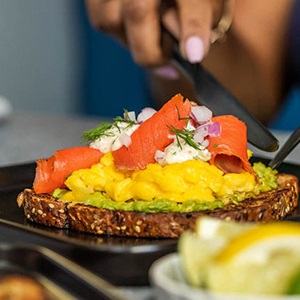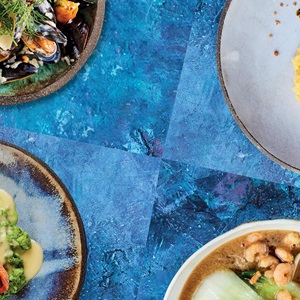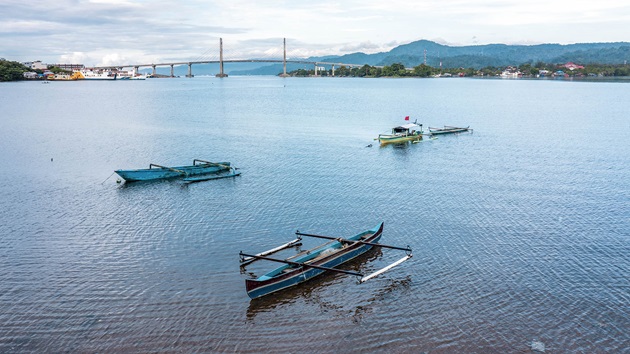1. ‘Super seafood’ is packed with nutrients
Seafood is full of important nutrients, such as zinc, iron, vitamins A and B12 as well as omega-3 fatty acids all essential for human health.
Oily fish such as salmon and herring contain pound for pound more essential nutrients than nuts, grains, meat, leafy veg or seeds.
Research has shown that, when consumed in seafood, these nutrients are better absorbed and utilised by the body than nutrients from vegetables and food supplements.
2. Wild seafood is a planet-friendly option
Fishing has a lower environmental impact than land-based animal farming because it uses very little land or fresh water and doesn’t require feed or fertilisers.
3. Eating fish instead of meat can help to reduce carbon emissions
Eating wild caught seafood results in less than one tenth the amount of carbon dioxide associated with red meat. It also has a lower carbon footprint than cheese or chicken.
Certain seafoods, including small fish such as herring, mackerel and sprat have lower carbon emissions than rice and corn, while also being some of the most nutritious fish to eat.
4. There are thousands of different types of seafood to try
There are over 2,200 species of wild caught seafood and 600 farmed, yet most of us only regularly eat a small number of different fish. In America, the 10 most popular types of seafood account for 77% of all seafood consumption.
5. People have been eating fish for nearly 2 million years
The earliest definitive evidence of early humans eating aquatic animals dates back to 1.95 million years ago in Kenya. It was around this time that bigger-brained humans started to evolve.
5. Fish is the most globally traded food – more than sugar or coffee
Seafood is the most highly traded commodity in the global food system, with trade doubling in both quantity and value between 1998 – 2018.
The annual value of the international trade of seafood is USD$151 billion – worth more than five times the trade value of coffee and around US$30 billion more than sugar. This makes seafood essential to many national economies.
6. It’s not all about food – millions of people depend on fishing as a way of life
600 million people depend on seafood for employment. And it’s not just fishermen – more than half those working in the seafood sector are women. Fishing is also engrained in the culture of many coastal communities.
What is the Blue Transformation?
7. By fishing sustainably, we can actually catch more!
By taking care of the ocean and only fishing what it can provide, we can actually catch more fish. Ending overfishing could result increase global annual seafood production by 16 million tonnes – enough to meet the protein needs of an additional 72 million people per year.
9. Globally people are eating more fish
Global demand for seafood expected to double by 2050. To meet this increasing demand and feed a growing global population, governments must support and recognise fisheries that are managing the ocean sustainably. We’re also likely to be eating more farmed fish.
10. By choosing sustainable seafood, you’re helping make sure future generations enjoy fish too
By buying seafood with the MSC blue label, or the green ASC label on farmed fish, you will be supporting responsible fishers helping to ensure an ocean full of life and delicious seafood for future generations to enjoy.

Foodie's guides
Our in-depth guides on the best ways to cook popular species like tuna, salmon and more...

The Ocean Cookbook 2023
17 delicious and healthy sustainable seafood recipes brought to us by chefs from around the world.

Sustainable seafood recipes
The latest recipes using delicious sustainable seafood from around the world for you.

